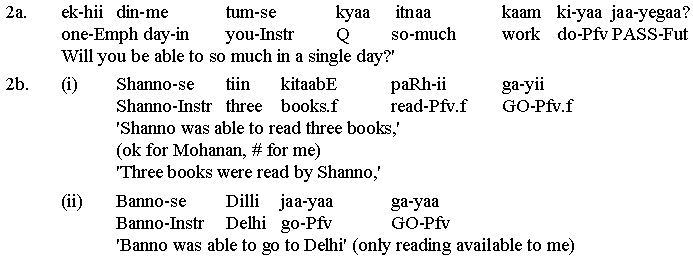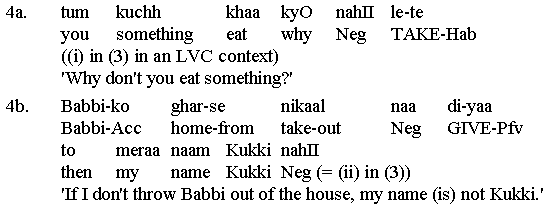
Freitag, 11.30 Uhr
I argue that certain complex predicates in Hindi should be treated as polarity items. In particular, I argue that the passive of inability (1a, cf. Hook (1979), Pandharipande (1982), Mohanan (1994), Butt (1997), henceforth POI) is a negative polarity item and that the light verb construction (1b, cf. Hook (1974) and refs. therein, Butt (1993, 1997), Pandharipande (1993), and Singh (1994) henceforth LVC) is a positive polarity item.

(called Passive of Inability because it involves passive morphology -Pfv GO- and typically involves predication of an inability)

(Light Verb Construction, the second verb behaves as if it were light, does not contribute its lexical meaning)
Traditional grammars (Cf. Kellogg (1938)) claim that the POI can only occur with negation. Similarly it has been claimed that the LVC is incompatible with negation. However, it has since been noted that the above claims are too strong. I show that the environments in which the POI and the LVC violate the restrictions claimed for them by traditional grammarians form a coherent semantic class. They are all +Affective environments i.e. environments where NPIs are licensed. POI interpretations are available in NPI-licensing environments without the presence of an overt negation. On the other hand, the presence of an Affective environment suffices to cancel the effect of an overt negation in an LVC and allows the LVC to occur with an overt negation. I will first discuss the case of the POI and then discuss LVCs.

The dialect of Hindi discussed by Mohanan (1994) (or the dialect of Urdu discussed in Butt (1997)) are more liberal in the licensing of the POI than the dialect I will discuss (henceforth Lucknow Dialect (LD)). In LD, it is possible to interpret (2a) as a POI but not (2b). (2b) can only be interpreted as a passive in LD - consequently while the first sentence in (two b) can be assigned a passive interpretation, the second sentence which involves the impossible passivization of 'go' cannot. It is instructive to look at the other environments where the POI is licensed in LD:
3. (i) Questions, (ii) Antecedents of if -clauses, (iii) Neg-Raising environments, (iv) Expressions of negative connotation such as 'mushkil-se' (with great difficulty) and (v) Expressions involving 'only'.
From work on NPI-licensing (Ladusaw (1977, 1980, 1983), Linebarger (1987) i.a.), we know that the first four of the environments listed in (3) are NPI-licensing environments. Assuming a Rooth-style semantics for 'only' , I show how the licensing of a POI by the presence of 'only' fits in with the NPI-licensing story.
Similar constraints apply to LVCs - only since the LVC is a positive polarity item, the +Affective environment does not license the LVC itself but composes with the overt negation that occurs in (4) in effect cancelling it out.

Environments (iii), (iv) and (v) in ( three ) also permit negation to appear in an LVC. Finally I will discuss other cases of negation co-occurring with an LVC and assimilate them to the analysis presented here. I will also present a formal account of how Affective environments 'cancel' out the negation in LVCs.
zum Programm der AG 7
zur alphabetischen ‹bersicht der Abstracts
zur zeitlichen ‹bersicht